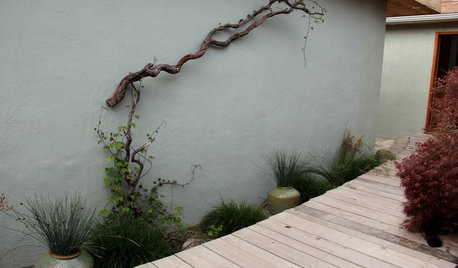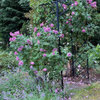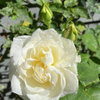Previously sprayed roses, can they adapt to life without spraying
Bellport
19 years ago
Related Stories

MATERIALSInsulation Basics: What to Know About Spray Foam
Learn what exactly spray foam is, the pros and cons of using it and why you shouldn’t mess around with installation
Full Story
LIFE6 Ways to Cool Off Without Air Conditioning
These methods can reduce temperatures in the home and save on energy bills
Full Story
GARDENING AND LANDSCAPINGHow to Make a Pond
You can make an outdoor fish paradise of your own, for less than you might think. But you'll need this expert design wisdom
Full Story
BATHROOM COLOR8 Ways to Spruce Up an Older Bathroom (Without Remodeling)
Mint tiles got you feeling blue? Don’t demolish — distract the eye by updating small details
Full Story
LIFEHow Your Landscaping Can Keep Burglars Away
Prevent home break-ins with strategic landscaping and good practices instead of menacing — and maybe less effective — measures
Full Story
DECORATING GUIDESSee How Wabi-Sabi Can Bring Harmony and Beauty to Your Home
Create your own wabi-style style with beautifully weathered, humble materials around the house
Full Story
4 Easy Ways to Renew Your Bathroom Without Remodeling
Take your bathroom from drab to fab without getting out the sledgehammer or racking up lots of charges
Full Story
HOLIDAYSSpend Less Without Being a Grinch: 8 Holiday Ideas
Give meaningful gifts and use nature's decor to work holiday magic without blowing your budget
Full Story
KITCHEN SINKSJust a Touch: Faucets Without the Fuss
Faucets that turn on with a tap of the finger, forearm or hand are great for messy hands or full arms
Full Story
KITCHEN DESIGNKitchen of the Week: What a Difference Paint Can Make
A bold move gives a generic Portland kitchen personality without a major overhaul
Full StoryMore Discussions










Field
BellportOriginal Author
Related Professionals
Beavercreek Landscape Architects & Landscape Designers · Brentwood Landscape Architects & Landscape Designers · Clark Landscape Architects & Landscape Designers · Middle River Landscape Architects & Landscape Designers · Milford Landscape Contractors · Wilmington Landscape Contractors · Galt Landscape Contractors · Indio Landscape Contractors · Los Banos Landscape Contractors · Mission Landscape Contractors · Streamwood Landscape Contractors · Sun City Center Landscape Contractors · Wallingford Landscape Contractors · Wentzville Landscape Contractors · Wethersfield Landscape ContractorsJAYK
Kimmsr
User
henry_kuska
henry_kuska
henry_kuska
althea_gw
henry_kuska
henry_kuska
michaelg
henry_kuska
BellportOriginal Author
althea_gw
henry_kuska
althea_gw
Field
henry_kuska